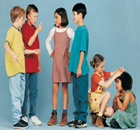-
-
China Daily E-paper
Domestic Affairs
Fluff flurries
By Linda Gibson (chinadaily.com.cn)
Updated: 2010-05-05 08:59
 |
Large Medium Small |
In some ways, Beijing's plant life is very much like that of the Midwestern American city of Chicago. This time of year, we both enjoy the fragrant blooms of lilacs and endure sneeze-inducing pollen. The roar of lawn mowers, often much too early for nearby sleepers, signals the arrival of grass cutting season.
But there's one phenomenon shared by the two cities that nonetheless reveals how different they are from each other. These are the annual flurries of fluff falling from poplar and willow trees.
Here in Beijing, these little pieces of feathery light fluff elicit much complaining. They're accused of being fire hazards, although it's hard to imagine how this could be. They aren't likely to spontaneously combust, and getting any of them to hold still long enough to be set on fire is probably almost impossible.
In addition, Beijingers accused them of flying up noses. This also strikes a Chicagoan as a curious objection, since a solution is so obviously at hand. All Beijingers have to do is wear face masks, which many of them already don routinely.
In fact, face masks are much better at deterring fluff than they are at stopping air pollution or disease germs.
So disturbed are some people by tree fluff that solutions used here include chemical warfare and sexual sterilization. These are powerful weapons to level at such weightless adversaries.
In Chicago, residents of neighborhoods graced with lots of poplars-or cottonwoods, as they're also called-treat the annual inundation of fluff with attitudes ranging from indifference to enjoyment. It falls so thickly it piles up into drifts along street curbs and covers grass lawns with a layer of snow-like white stuff.
It enters dwellings clinging to hair, clothes and pets. Once inside, as every Beijinger and Chicagoan knows, it's almost impossible to remove. It simply won't hold still for being caught.
But nobody in Chicago worries about this. There are worse things falling from the skies. In Chicago, bird poop mars many a parked car. In Beijing, dust from the Gobi Desert invades apartments. Both substances require a lot of work to clean away.
But the fluff just disappears as suddenly as it fell. No need to do anything. In two weeks or less, it will simply be gone. Beijingers will move on to complaining about something else, which surely will have more substance than the wispy fluff of future trees.









